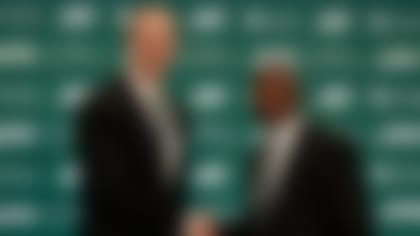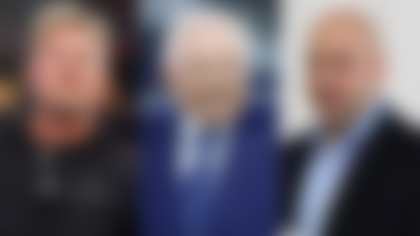PHILADELPHIA -- There's a line of demarcation at the Philadelphia Eagles' facility during training camp on Sunday, and on the east side of it now sit four empty practice fields. Just over it, there are three mountains of humanity, cameras and boom mics -- with quarterbacks in there ... somewhere.
Chip Kelly looks over. It's all a little much.
But this is the spotlight he chose to work under, the stage that the game's highest level is played on. And his reluctance to seek it out is why, over the last three years, the chase to learn anything about the very private Eagles coach has been relentless.
"I just think it's bizarre," Kelly said, a Sam Bradford bomb away from the crowd. "I just coach football. That's what it's all about. Why people want to know about that other part, I don't know. I'm not a social media guy, I don't tweet, I don't Facebook, whatever all that stuff is. It's no different than Darren Sproles (not liking to) talk to the media. It bothers me when people don't respect that. Because you play a professional sport or you coach a professional sport, why does it have to be like that?"
On Sunday, Kelly kicked off his third camp as Eagles coach, and he's no less intriguing a figure to the general public than he was when he left Oregon in January 2013.
But we've learned some more since then. We now know that he can coach in the NFL, as his 20 wins over two seasons would attest. The increased control over personnel he's gathered -- Bill Belichick is the only coach in the NFL who has more power written into his contract -- has provided a window into what he wants in players. We're also well-aware that, for better or worse, he's not afraid to challenge long-held pro-football convention, something that might be most clear in how he's turned over quarterbacks the last 30 months.
And now, thanks to a Washington Post story published in July, we know that Kelly was once married, dispelling the long-held assumption that he's been a lifelong bachelor.
"She's awesome," Kelly said of ex-wife Jennifer Jenkins. "She's a good person. And I was married for a while. And I never tried to hide that -- it was in the University of New Hampshire media guide, just like it always was. And I was never asked the question before. No one ever said that, so I don't know why it's a revelation. Not a revelation to me. Everybody in my life -- my family, my parents, her family, my girlfriend now -- they all know what my life is all about. I'm not a People Magazine or an US Magazine guy."
To a large degree, though, the NFL has embraced that idea of football-as-soap-opera.
Kelly can't stop it. But he can choose not to participate.
"I have a very bland, quiet life," he said. "There's not a lot there. And I'm not hiding anything, either. There's no revelations. You wanna talk football? I'll talk football. That's my job."
OK, let's do that.
The Eagles' January front-office restructure empowered Kelly to lead philosophical change -- a smaller draft board, more specifics for each position, a more intense focus on the details of players he's been emphasizing since he arrived in Philly.
The result was on display Sunday.
"I think everyone understands," Kelly said. "I mean, you look at them, everybody looks alike. The D-line is the right size, the linebackers are all similar size guys, the wideouts are bigger, the DBs are bigger. It's just what we're trying to get to. It takes time in this league, because you're just not trying to change everything in one year, y'know?"
That said, the facelift was accelerated in early 2015.
The changes at tailback and defensive back are nearly total, while major additions have come at quarterback and inside linebacker, and a gradual overhaul at receiver has been completed. Three of the four highest-paid players on the team for this season were playing elsewhere in 2014. The biggest contract left from the old, Andy Reid regime is Brent Celek's, and he's the ninth-highest paid player on the current roster. Next after that is Fletcher Cox, who's still on his rookie deal.
Point is, where other teams churn the middle and bottom of their roster, Kelly churned the top of his, an acknowledgement that he feels the previously constituted group had hit its ceiling.
"I felt like ... 10-6 isn't good enough," he said. "I think we all felt like that. Now, you can say, 'We're 20-12, we took over a 4-12 team and went 20-12.' But unless you're the team that holds the trophy at the end of the year, it doesn't matter. So what do we need to do to take the next step, not just to make it, but to win in the playoffs. That's what we're trying to gear up and do."
The hope is this team doesn't give up as many explosive plays, the kind that prompted the Eagles to detonate last year's secondary and start over with Byron Maxwell and Co. (The latest move in this area: trading Brandon Boykin, who just made waves on his way out of Philly by saying Kelly is "uncomfortable with men of our culture.") And the idea is to be deeper at spots like inside linebacker and, yes, quarterback, where the Eagles have felt the effects of guys going down.
Kelly does feel like that much has been accomplished: "We have a lot more depth than we've had at every position. I think it's more competitive overall." But beyond just having enough good players, there's also more rhyme and reason to how everything is built now that they've had a few years, and it's similar to what Kelly did at Oregon.
The coach explained that until he found Marcus Mariota, he had to rework what he did offensively to fit Jeremiah Masoli and Darron Thomas. "And then, when you go from Darron Thomas to Marcus," he said, "now you're finally getting the quarterback you wanted to fit that system."
Maxwell does that for the Eagles at corner. First-round pick Nelson Agholor does it at receiver. Free-agent signee DeMarco Murray does it at tailback. And that brings us to the biggest question, which is whether the Eagles have the quarterback to do it for them.
In a talk with local reporters last month, Kelly went into a macro discussion on the position, and how hard it is to find a great signal caller without getting really bad first. He raised Drew Brees and Peyton Manning -- elite QBs who switched teams solely because of injury -- to illustrate why Sam Bradford was attractive.
It doesn't stop there.
"Sam fits for what we're trying to do in the NFL," Kelly said. "I think people's misconception is that we're trying to run the offense that I was running in college. And we're not doing that."
During Day 1 of camp, Bradford took part in 11-on-11 work for the first time since suffering a torn ACL last August. He got every snap with the first team.
As Kelly assessed it, "It was just good to see Sam back out there from a timing standpoint. A lot of it is just moving fast for him from a timing standpoint because he really just did a little bit of 7-on-7s at the tail end of minicamp. So this is the first time he's taken significant snaps (in a year)."
But all that work with the starters, Kelly said, doesn't entrench him with the first team.
Looking at the investment -- the Eagles sent Nick Foles, as well as second- and fourth-round picks, to St. Louis; got Bradford, a fifth-rounder and a conditional pick back; and are paying Bradford $13 million -- it seems obvious the ex-Ram will start. But Mark Sanchez, making less than half what Bradford is, put together a strong spring, and Kelly wants to give him a fair opportunity.
"He's got a great chance, Mark had a great day today," Kelly said. "It's the same thing: You have to let it play out. The only way it's fair is if the best players play. And the players know that. Now, every guy will tell you he's the best, but that's not always the case. I've never had a guy say, 'I'm not the one.' But the way we train, everyone gets enough reps where you can tell who the best is, over time."
Unspoken there, of course, is that Kelly knows he has to pull every lever to get that position right, because the player there, more often than not, ties directly with the coach's job security in the NFL. And it's likely to have a large effect on whether or not Kelly's much-ballyhooed program is seen as a proven success at the pro level.
Long before Kelly was thinking about what he wanted in an NFL quarterback, and how it's different than what he was looking for in college, the coach spent considerable time researching programs in the pros.
He made a Wednesday trip to watch the Seahawks operation and visit Pete Carroll during one Oregon bye week. He went to California to see Jim Harbaugh and the 49ers on another Wednesday during another college bye. Kelly compares those trips, in their benefits for Oregon, to one he took to Air Force, to study how kids at the academies get a lot done football-wise in a short time amid a crowded schedule.
The side benefit: He knew a little more about running an NFL program than he let on in 2013.
"A lot of guys helped in sharing with me, even when they visited," Kelly said. "Marvin Lewis was a guy, when he came out on a pro day to talk to us, talk to me about the league. ... You can always get something from somebody, and the great thing about our profession, most coaches, unless you're gonna play them, are pretty open. At that time, I wasn't playing Jim or Pete. Those two guys are great."
So he prefaces his comments on what he's learned since coming to the NFL by emphasizing he didn't enter the room with a blindfold on.
But he also concedes there's plenty he's picked up along the way.
"I think we understand it better, what we're trying to do and how we're trying to put it together," Kelly said. "Everyone is a byproduct of their experience. You have two more years of experience."
The football part isn't that complicated, which brings us back to the part he'll never get used to.
To be clear, Kelly isn't begrudging anyone in football who wants to take the spotlight -- he's just choosing to stay away from it. If that makes him a mystical figure, as he sees it, so be it. Kelly would just tell you it's simpler than that.
"To be honest with you, what we do isn't important," he said. "I'd like to know what the best doctors in this country do. They're the people you should be studying. Or the real heroes, the people in the military, policemen or firemen. I think people's infatuation with athletes and coaches, it's a little warped."
He adds this line: "I take my work seriously, but I don't take myself that seriously."
And a couple minutes later, he heads into the office to continue his workday.
A little further down that line, the cameras remain.
Follow Albert Breer on Twitter @AlbertBreer.











